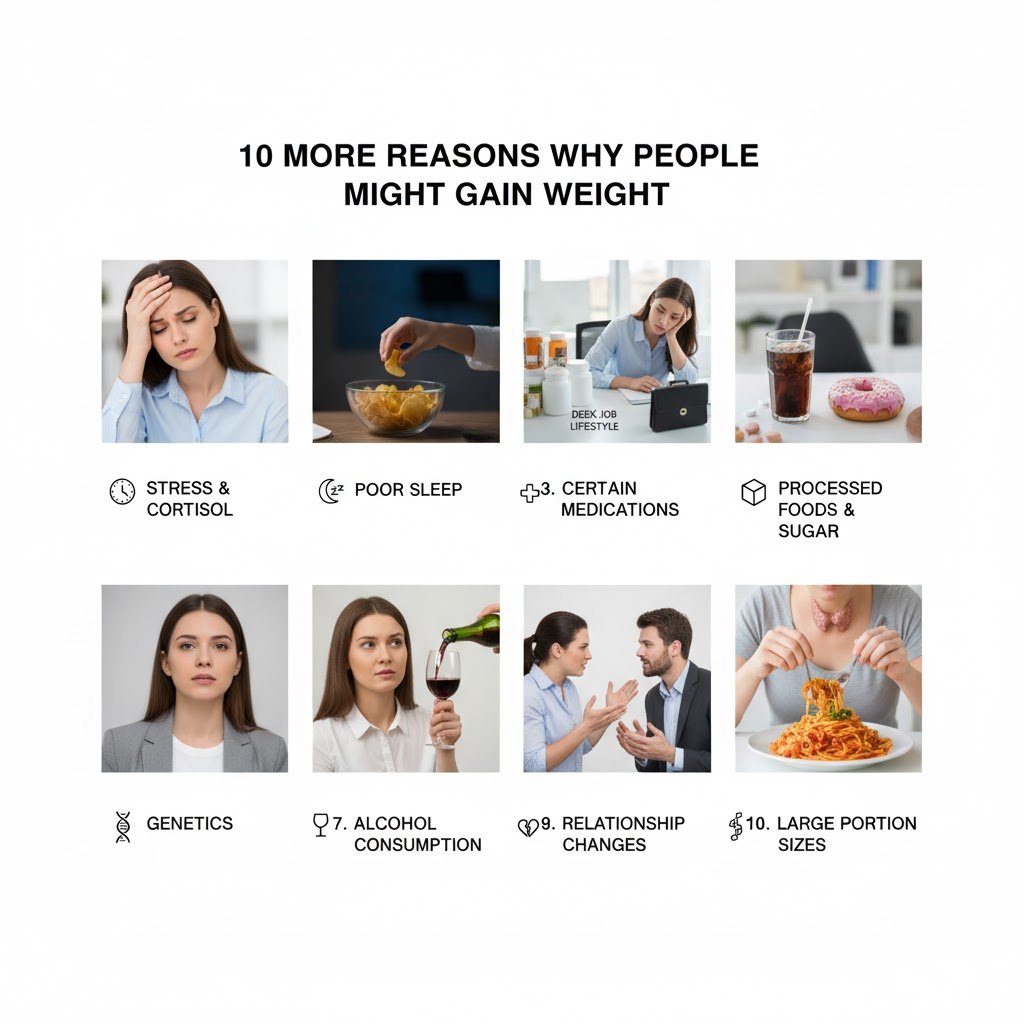“You look so happy! You’ve both gained a little weight.”
People often say this to newly married couples. For years, I’ve seen this pattern in my patients at Doctiplus. As Rachel, with 19 years of experience as a doctor, I can tell you this is a very real thing. It’s not just a guess; it’s something we doctors have studied.
Many people think that when a couple is very much in love, they stop worrying about their weight. But is that the whole story? I want to explain what really happens, using simple words, so you can understand the science behind it. I will also share some things I’ve learned from my patients and give you advice on how to stay healthy while being happy together.
What Do the Studies Tell Us?
Different groups of doctors have looked into this. Their findings help us see the whole picture.
Finding 1: A Happy Couple Might Gain Less Weight
This might sound confusing. But one researcher at Harvard, Ying Chen, studied over 2,650 couples. He found that couples in very happy relationships sometimes gained less weight than couples who were not as happy.
- What this means: Being happy doesn’t always mean you will gain a lot of weight. A strong, supportive relationship can sometimes help you make better choices.
Finding 2: Living Together Changes Your Habits
A big study from the University of North Carolina looked at more than 8,000 people. They found a clear pattern:
| Living Situation | Average Weight Gain Over 5-6 Years |
|---|---|
| Married Women | 24 pounds |
| Women Dating (but not living together) | 13 pounds |
| Married Men | Over 25 pounds more than single men |
But here is the interesting part I always tell my patients: marriage also has good health effects. The same study saw that married couples often drank less alcohol and smoked less. They were swapping some bad habits for better ones, but they were also eating more.
Finding 3: Weight Gain Can Spread Between Partners
The New England Journal of Medicine published a famous study. It showed that weight gain can be “contagious” between people who are close.
- If one person in a couple gains weight, the other person has a 37% higher chance of gaining weight, too.
- Why? You start to share the same life. You eat the same meals, watch the same TV shows, and have the same daily routines. If one person likes a big dessert, the other often joins in.
Finding 4: A Calm, Happy Life Can Lead to Weight Gain
The National Institutes of Health (NIH) in the USA studied couples who had been married for four years or more. They found:
- Couples with less stress and a calm, happy life often gained weight.
- Couples with a lot of stress in their relationship did not gain as much weight.
Think of it like this: When you are single and dating, you might feel more pressure to look a certain way. When you are in a secure, loving relationship, you feel accepted for who you are. You don’t feel you have to impress your partner by being super thin. You are comfortable.
My Experience as a Doctor at Doctiplus
I have seen this many times in my 19 years. Let me tell you about one couple, Sarah and Tom.
When Sarah and Tom first started coming to me, they were newlyweds. After about two years, they both came in for a check-up. They had each gained about 15 pounds. They were laughing about it. Tom said, “I guess we’re just too happy, doctor!”
I explained to them what was happening. They had started a tradition of making a big, cheesy pizza every Friday night. They also loved to relax on the couch with a bowl of ice cream after work. They were happy, and their habits showed it. Their weight gain was a direct result of their shared, comfortable life.
How Can You Stay Happy and Healthy? Advice from a Doctor
Gaining weight in a happy relationship is common, but it doesn’t have to be permanent. You can be happy and healthy. Here are some things I tell my patients at Doctiplus.
1. Make Healthy Habits a Team Activity
Don’t think of it as “my diet” or “your diet.” Think of it as “our healthy life.”
- Cook Together: Instead of ordering a pizza, try making a healthy meal together. You can find fun recipes online. It becomes a fun activity, not a chore.
- Shop for Groceries Together: When you shop, make a list of healthy foods you both like. Fill your cart with fruits, vegetables, and lean proteins.
- Swap Your Snacks: Instead of ice cream, try making a fruit salad with a little yogurt. Instead of potato chips, try air-popped popcorn.
2. Move Your Bodies Together
You don’t have to run a marathon. Just find ways to move more, together.
- Take an Evening Walk: After dinner, go for a 20-minute walk around your neighborhood. It’s a great time to talk about your day without any screens.
- Try a Fun Activity: Go for a bike ride, play frisbee in the park, or try a beginner’s dance video on YouTube. Laughing while you exercise makes it enjoyable.
- Set a Small Goal: Challenge each other to see who can take more steps in a day, using a phone or a simple pedometer.
3. Pay Attention to Your Portions
When you are comfortable with someone, it’s easy to eat bigger portions.
- Use Smaller Plates: This makes a normal portion of food look bigger.
- Listen to Your Body: Stop eating when you feel full, even if there is food left on your plate. You can save it for later.
- Drink Water: Sometimes, your body feels hungry when it is really just thirsty. Drink a glass of water before you have a snack.
4. Keep an Eye on Your Health as a Team
- Weigh Yourselves Together: Once a week, weigh yourselves. Don’t get upset about the number. Just use it as information. If you see the number going up for a few weeks in a row, it’s a sign to check your habits.
- Go to Doctor Appointments Together: Come to your check-ups as a couple. It shows you support each other’s health. At Doctiplus, we love when couples do this because it helps us give better advice.
10 more reasons why people might gain weight.

1. Your Thyroid Gland is Slowing Down
Your thyroid is a small gland in your neck that works like your body’s thermostat. It controls how fast your body uses energy. Sometimes, it can become underactive—a condition we call hypothyroidism. When this happens, your metabolism slows down. It’s like your body’s engine is suddenly set to a lower speed, so you burn fewer calories, even if you’re eating the same amount of food.
2. The Side Effects of Necessary Medications
Many important medicines can cause weight gain as a side effect. This doesn’t mean the medicine is bad; it’s just how your body reacts. Common ones include:
- Some medicines for depression and anxiety.
- Medicines for high blood pressure.
- Steroids (like prednisone).
- Some allergy medicines.
My advice: Never stop taking a prescribed medicine because of weight gain. Always talk to me or your doctor first. We can often adjust the dose or find a different medicine that works for you.
3. Your Body is Changing with Age (Sarcopenia)
As we get older, starting as early as our 30s, we naturally begin to lose muscle mass. This process is called sarcopenia. Muscle tissue burns more calories than fat tissue, even when you’re just sitting still. So, if you have less muscle, your body needs fewer calories. If you keep eating the same way you did when you were 20, you will likely gain weight because your body isn’t burning it off as quickly.
4. You Aren’t Sleeping Enough
This is a big one that people often ignore. When you don’t get enough good sleep, two things happen:
- Your hormones get confused: Your body makes more of a hormone called ghrelin, which tells you you’re hungry, and less of a hormone called leptin, which tells you you’re full.
- You have less energy: When you’re tired, you’re less likely to be active and more likely to reach for sugary snacks for a quick energy boost.
5. You Are Dealing with Chronic Stress
When you’re constantly stressed, your body produces high levels of a hormone called cortisol. One of cortisol’s jobs is to tell your body to store fat, especially around your belly. It’s an ancient survival instinct that isn’t very helpful for dealing with modern-day stress from work or life.
6. You Drink Your Calories
It’s easy to forget about the calories in drinks. A large sweetened coffee drink, a soda, or even a few glasses of juice or alcohol can add hundreds of extra calories to your day. Liquid calories don’t make you feel as full as solid food, so you don’t usually eat less to make up for them.
7. A Condition Called Polycystic Ovary Syndrome (PCOS)
For women, PCOS is a common hormone imbalance that can make weight gain very easy and weight loss very difficult. It often causes the body to be resistant to insulin (which I’ll explain next), leading to weight gain around the middle.
8. Your Body Isn’t Responding to Insulin Correctly
Insulin is a hormone that helps your body use sugar for energy. When you eat too many sugary and processed foods over a long time, your body can stop responding to insulin properly. This is called insulin resistance. To cope, your body makes more and more insulin, and high insulin levels tell your body to store fat.
9. Your Gut Bacteria Are Out of Balance
Inside your intestines are trillions of tiny bacteria that help you digest food. This is your gut microbiome. Some types of bacteria are better at extracting calories from food than others. If you have an imbalance, with too many of the “energy-hungry” bacteria, you might absorb more calories from the same amount of food than someone else would.
10. Pain That Stops You from Moving
Chronic pain in your back, knees, or hips can make it very hard to stay active. When movement becomes painful, you naturally do less of it. This reduction in daily activity means you’re burning far fewer calories, which can lead to weight gain over time. It can become a difficult cycle, as the weight gain can then make the pain even worse.
If any of these causes sound familiar to you, the best next step is to have a conversation with your doctor. At Doctiplus, we can help you figure out the root cause and build a plan that works for your body and your life.
A Final Thought
All these studies were done for one main reason: to help couples live healthy lives and avoid problems from being overweight.
The main idea is not that happiness makes you fat. The main idea is that when two people share their lives, their habits—both good and bad—start to match. Your happiness makes you feel safe and comfortable, which can change your habits.
You can be a happy couple and a healthy couple. It’s about working together. Talk to each other. Support each other. Make small changes that you can keep doing for a long time. Your future, healthier selves will thank you for it.
If you have any concerns about your weight or health, the best thing to do is to talk to a doctor. We are here to help you find a plan that works for you and your partner.

